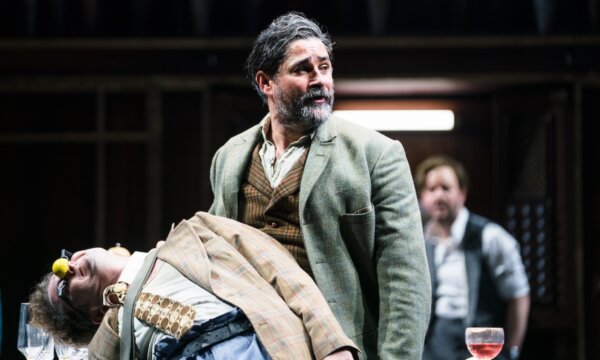Writer: William Shakespeare
Director: Prasanna Puwanarajah
Twelfth Night is quite rightly one of Shakespeare’s most popular plays. It is a delicate combination of comedy and melancholy, music and poetry with elements of farce and slapstick. Prasanna Puwanarajah’s new production for the RSC works hard to find the right balance between all of these elements and whilst it largely succeeds, it is not an unqualified success.
and melancholy, music and poetry with elements of farce and slapstick. Prasanna Puwanarajah’s new production for the RSC works hard to find the right balance between all of these elements and whilst it largely succeeds, it is not an unqualified success.
The beating heart of the production is Michael Grady-Hall’s outstanding Feste. Far more of a real clown than the character has recently been presented, his interpretation captures the anarchic energy of the role. Still, he also knows when to tone down the comic intensity to increase the pathos inherent in the writing. It is a masterclass in how to play Shakespearean clowns – probably one of the hardest challenges in the canon. This performance alone is worth the price of admission.
The role of Fabian has always been rather hard to define. But Daniel Millar brings fresh energy and clarity to the part and establishes Fabian as being truly central to the comedy of the play. This is a rare achievement and one that should not underestimated.
In many ways, the same can be said of Freema Agyeman’s take on Olivia. She is far more feisty and spiky than many actors have taken the character. And that brings a freshness to lines that could feel commonplace.
Malvolio is one of the great roles for a character actor, and choosing Samuel West feels like a very appropriate casting decision. However, his rather subdued interpretation means that he is occasionally overwhelmed by the higher energy of some of his cast mates. He still delivers some standout moments, but not quite as many as the role has to offer.
Visually, the production lacks a coherent aesthetic. There are many striking stage images and some interesting costume choices but it is not totally clear in which period the play is actually set. A number of elements clearly evoke an early to mid-20th century setting, at other times we are very firmly in the modern day with twerking and Hello magazine. Whilst playing with period is a legitimate choice, it should feel internally consistent.
There is no doubting that this is a performance with plenty of laughs. However, a large proportion of them come from excellent physical comedy and many from interpolations into Shakespeare’s text. Whilst this is a perfectly legitimate directorial approach, it shows a certain lack of trust in the original lines. It is a matter of balance and the production does not yet feel like it has fully found that.
This is also true of the running time which is currently just over three hours including one interval. Whilst the production does not feel as if it drags, it is still longer than it needs to be. Matt Maltese has contributed some well-crafted songs and they are delivered well but, at times, they risk overstaying their welcome. This is particularly noticeable in the closing moments where it takes too long to get to Feste’s final song.
There is still much to enjoy. It is an entertaining take on a well-loved play but it does not fully achieve its full potential. As the run continues, no doubt, many of these elements will be refined and characterisations will become richer and even more interesting.
Runs until 18 January 2025

